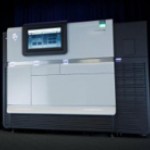whole-genome sequencing
As part of his Gene Week celebration over at Forbes, Matthew Herper has a provocative post titled "Why you can't have your $1000 genome". In this post I'll explain why, while Herper's pessimism is absolutely justified for genomes produced in a medical setting, I'm confident that I'll be obtaining my own near-$1000 genome in the not-too-distant future.
Matt's underlying argument is that while sequencing costs will continue to drop, obtaining a complete genome sequence that is sufficiently accurate for medical interpretation will require additional expenses (increased sequence coverage to…
As part of his Gene Week celebration over at Forbes, Matthew Herper has a provocative post titled "Why you can't have your $1000 genome". In this post I'll explain why, while Herper's pessimism is absolutely justified for genomes produced in a medical setting, I'm confident that I'll be obtaining my own near-$1000 genome in the not-too-distant future.
Matt's underlying argument is that while sequencing costs will continue to drop, obtaining a complete genome sequence that is sufficiently accurate for medical interpretation will require additional expenses (increased sequence coverage to…
Late last week I stumbled across a press release with an attention-grabbing headline ("The Causes of Common Diseases are Not Genetic Concludes a New Analysis") linking to a lengthy blog post at the Bioscience Resource Project, a website devoted to food and agriculture. The post, written by two plant geneticists, plays a tune that will be familiar to anyone who has encountered the rhetoric of GeneWatch UK: basically, modern genomics is pure hype perpetuated by scientists seeking grant money and corporations seeking to absolve themselves of responsibility for environmental disasters. …
A reminder to anyone who reads my other blog Genomes Unzipped that we have a reader survey underway there now, which includes some questions about genetic testing experiences and attitudes towards genetics. We're closing the survey to responses this weekend, so if you're an Unzipped reader but haven't had a chance to fill in the survey, please do so now.
Update 30/11/10: 23andMe has extended their 80% discount until Christmas, without a need for a discount code.
Personal genomics company 23andMe has made some fairly major announcements this week: a brand new chip, a new product strategy (including a monthly subscription fee), and yet another discount push. What do these changes mean for existing and new customers?
The new chip
23andMe's new v3 chip is a substantial improvement over the v2 chip that most current customers were run on (the v2 was introduced back in September 2008). Firstly, the v3 chip includes nearly double the…
Back in June I launched a new blog, Genomes Unzipped, together with a group of colleagues and friends with expertise in various areas of genetics. At the time I made a rather cryptic comment about "planning much bigger things for the site over the next few months".
Today I announced what I meant by that: from today, all of the 12 members of Genomes Unzipped - including my wife and I - will be releasing their own results from a variety of genetic tests, online, for anyone to access. Initially those results consist of data from one company (23andMe) for all 12 members; deCODEme for one…
Jay Flatley, CEO of sequencing giant Illumina, announced at the Consumer Genetics Conference today that the company had reduced the price of its retail whole-genome sequencing service. At $19,500 this still isn't in the realm of an impulse buy for most of us, but it's a long way down from the $48,000 that Illumina offered at the launch of its service, and more than an order of magnitude below the $350,000 price paid for the first ever retail genome.
Illumina's press release notes that bulk orders of 5 or more genomes drop the price to $14,500 per genome, and "[i]ndividuals with…
A paper just released in the Lancet describes a thorough and integrated approach to squeezing as much clinically relevant information as possible out of a genome sequence. However, despite a state-of-the-art clinical interpretation pipeline, the major message from the paper is just how far we still have to go before we can make full use of our genetic information.
The paper is based on the genome of Stephen Quake (right), which was sequenced using the single-molecule platform developed by Helicos (I wrote about Quake's genome publication at the time). This is a rather curious choice: of all…
It's a big week for family genomics. I wrote a couple of days ago about the West family, all four members of which recently had their entire genomes sequenced by Illumina. Now an article in the Salt Lake Tribune reveals the identity of yet another four-person nuclear family with complete genome sequences: the wife and two step-children of Utah geneticist Lynn Jorde, as well as the children's biological father.
This family were sequenced to explore the basis of the two separate rare, severe genetic diseases (Miller syndrome and primary ciliary dyskinesia) that affect the two children - that…
Mark Henderson breaks the news of the first sequencing of an entire nuclear family for non-medical (read: recreational) reasons. John West, his wife and two teenage children (aged 14 and 17) apparently paid the full retail price of almost US$200,000 (update: in the comments, Mark writes that West apparently got a "small" but not "hefty" discount off this retail price) to sequencing company Illumina to generate their complete DNA sequences.
The West family members are no strangers to sequencing - John West is the former CEO of Solexa, the sequencing technology company purchased by Illumina in…
Zoe McDougall from Oxford Nanopore points me to a press release from Illumina announcing a new era of celebrity genomics:
Illumina, Inc. (NASDAQ:ILMN) today announced that it has sequenced the DNA of American actress Glenn Close, the first publicly named female to have her DNA sequenced to full coverage. The service was completed in Illumina's CLIA certified and CAP accredited laboratory utilizing Illumina's Genome Analyzer technology and following the established process shown at http://www.everygenome.com/. Ms. Close's DNA was sequenced to an average depth greater than 30 fold, providing…
Lupski, J.R., et al. (2010). Whole-genome sequencing in a patient with Charcot-Marie-Tooth neuropathy. New England Journal of Medicine advance online 10.1056/nejmoa0908094
Roach, J.C., & et al. (2010). Analysis of genetic inheritance in a family quartet by whole-genome sequencing. Science : 10.1126/science.1186802
Two new papers out today - the first ever studies to employ whole-genome sequencing for disease gene discovery - neatly illustrate both the promise and the challenges lying ahead both for clinical and personal genomics.
The first paper presents the final -…
The main theme of this year's Advances in Genome Biology and Technology meeting should come as no surprise to regular readers: sequencing. Generating as many bases of DNA sequence as quickly, cheaply and accurately as possible is the goal of the moment, and the number of companies jostling to achieve that goal is growing rapidly.
The meeting saw impressive performances from established players in the field, especially Illumina: their new HiSeq 2000 instrument seems to have dug in as the platform of choice for generating vast amounts of high-quality short-read data. Life Technologies…
Stephen Turner from Pacific Biosciences gave a dramatic presentation this afternoon launching PacBio's new third-generation sequencing instrument. The room was packed for the seminar, with a palpable buzz, and Turner's presentation was preceded by a theatrical introduction from PacBio CEO Hugh Martin.
The crescendo of Turner's presentation was the unveiling of a video showing the new (and enormous) PacBio instrument, which has been tucked away in a room here at AGBT and revealed to a trickle of VIPs (including Bio-IT World's Kevin Davies) - if that's the kind of thing you're into,…
I've been remiss in blogging from the Advances in Genome Biology and Technology meeting here in Marco Island, Florida, primarily due to some panic-stricken last-minute changes to the slides for my own presentation last night.
Fortunately the conference has been extremely well-covered by others: Sanger colleague Luke Jostins has blog posts up summarising day 1 and day 2 of the meeting; Dan Koboldt from MassGenomics has his first impressions and a review of the cancer genomics session; and Anthony Fejes is continuing the tradition of publishing extensive notes on every talk he attends. …
I'll be at the Advances in Genome Biology and Technology meeting in Marco Island, Florida for the next week, soaking up sun and genomics, keeping my eye out for the anticipated major announcements from sequencing companies and researchers, and quietly panicking about my presentation on Thursday. You'll hear more about the meeting from me and the other bloggers there - Luke Jostins, David Dooling, Dan Koboldt and Anthony Fejes - over the next week.
It's amazing to think that it was at the same meeting in 2009 - just one year ago - that Complete Genomics emerged dramatically from stealth mode…
The big news from the JP Morgan investment conference today is the announcement of a brand new shiny sequencing machine from Illumina, the HiSeq 2000. The new machine boasts an impressive set of statistics, and looks likely to gradually replace Illumina's GAIIx as the workhorse of most modern sequencing facilities.
So, how excited should we be?
Let's be clear about this up front: this new machine, while impressive, represents an incremental advance rather than a dramatic technological leap forward. This is still second-generation sequencing, generating relatively small snippets of DNA…
The Gene Sherpa predicts that Complete Genomics will win the Archon X Prize in Genomics in 2010. In the comments, Keith Robison is wisely skeptical. I agree with Keith - it's unlikely that the X Prize will be won this year, and if it is the winner is unlikely to be Complete Genomics.
For those who don't know the prize, here's the brief summary: the X Prize Foundation will give US$10 million to the first team to satisfy the following conditions:
sequence 100 human genomes within 10 days or less, with
an accuracy of no more than one error in every 100,000 bases sequenced [note that the…
A curious tweet this morning from personal genomics company deCODEme, barely a few weeks after the declaration of formal bankruptcy of parent company deCODE Genetics:
@decodegenetics: Migrate to deCODE this winter! Upload your genetic data for free. http://www.decodeme.com/data-upload
Here's a description of the service from the URL in the tweet:
deCODEme wants to give even more people the chance to enjoy the best in personal genomics. Our bioinformatics team has just launched a simple system to enable existing customers of 23andMe⢠to migrate their data into deCODEme and to join our…
New-technology DNA sequencing provider Complete Genomics will provide near-complete genome sequences of 100 individuals to the Institute for Systems Biology, driving the first ever association study for a complex trait using whole-genome sequencing. Here's the press release, and GenomeWeb has some additional information.
This is pretty exciting stuff:
The Institute for Systems Biology (ISB) and Complete Genomics Inc. announced today that they are embarking on a large-scale human genome sequencing study of Huntington`s disease (HD). ISB has engaged Complete Genomics to sequence 100 genomes,…




